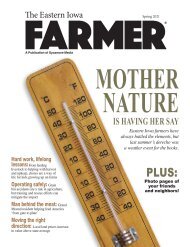Create successful ePaper yourself
Turn your PDF publications into a flip-book with our unique Google optimized e-Paper software.
Landowners should<br />
consider general<br />
legal issues for<br />
hunting ‘leases’<br />
By KRISTINE A. TIDGREN<br />
Director<br />
and JENNIFER HARRINGTON<br />
Staff Attorney<br />
Center for Agricultural Law & Taxation<br />
Iowa State University<br />
EASTERN IOWA FARMER<br />
Hunting ground is a precious<br />
commodity in Iowa. Hunters<br />
often approach landowners<br />
looking for ground<br />
to hunt. Whether to grant<br />
such permission and to whom to grant<br />
that permission is a complex decision.<br />
While many hunters in Iowa are<br />
knowledgeable about gun safety and<br />
their sport, every year there are new and<br />
beginning hunters. Having a well-drafted<br />
hunting lease or liability waiver<br />
can help ensure that both hunter and<br />
landowner understand their rights and<br />
obligations. It can also help ward off<br />
future problems.<br />
This fact sheet is designed to highlight<br />
basic issues landowners should consider<br />
when deciding whether to let someone<br />
hunt their ground and how to structure<br />
that relationship. It also reviews generally<br />
suggested hunting lease provisions.<br />
It is not designed to be a substitute for<br />
legal counsel.<br />
Liability<br />
Perhaps the most important issue landowners<br />
should consider in responding<br />
to requests to hunt on their property is<br />
whether they will be subjecting themselves<br />
to new liability for any injuries<br />
incurred by the visitors or because of the<br />
visitors.<br />
In 2013, the Iowa legislature revised<br />
the Iowa Recreational Use Statute,<br />
which encourages landowners to<br />
open their property to others for recreational<br />
uses (including hunting) to<br />
ensure that landowners are immune from<br />
liability related to recreational entrants.<br />
The statute expressly states that the<br />
landowner does not “assume responsibility<br />
for or incur liability for any<br />
injury” caused by an act or omission.<br />
There are two big exceptions to this<br />
liability protection. First, this protection<br />
only applies where the landowner directly<br />
or indirectly invites others to use the<br />
land for recreational purposes without<br />
charge. If the landowner charges a fee<br />
(through a hunting lease, for example),<br />
the landowner will then owe a higher<br />
degree of care to ensure the property is<br />
safe for use.<br />
This duty includes ensuring the<br />
premises are safe and there are warnings<br />
about dangerous conditions. For<br />
example, a landowner may be liable for<br />
resulting injuries if a hunter steps in a<br />
large hole on the property and breaks his<br />
leg or accidentally discharges his gun if<br />
the landowner did not adequately warn<br />
the hunter about the risks. Although a<br />
waiver of liability may serve to offset<br />
this risk for adult hunters, it is important<br />
for landowners to discuss potential hunting<br />
leases with both their insurer and<br />
legal counsel to protect against unwanted<br />
lawsuits.<br />
The second exception from liability<br />
protection is when the landowner willfully<br />
or maliciously fails “to guard or<br />
warn against a dangerous condition, use,<br />
structure, or activity.” Iowa Courts have<br />
not created a legal test for what constitutes<br />
willful or malicious action under<br />
this statute, but they have provided some<br />
guidance. A person acts willfully or maliciously<br />
when it is proven they had an<br />
intent to harm or acted indifferently to a<br />
very obvious harm. This is why it may<br />
be a good idea to have a potential hunter<br />
sign a specific liability waiver acknowledging<br />
the unavoidable risks of hunting<br />
and uneven terrain, even if they are not<br />
being charged to hunt. If an accident or<br />
event occurs, this waiver would be used<br />
to show that the landowner attempted to<br />
inform the hunter of potential harms.<br />
Hunting Lease Provisions<br />
Most hunting leases are not actually<br />
leases at all, but licenses. A license, as<br />
opposed to a lease, is a private grant of<br />
right to use real property for a particular<br />
purpose. As such, a hunting lease<br />
offers contractual rights, not an estate in<br />
real property. In other words, the parties<br />
do not take on an actual landlord-tenant<br />
relationship, and the landowner is not<br />
subject to burdensome landlord-tenant<br />
statutory provisions. The parties’ relationships<br />
to each other are defined and<br />
bound by the terms of their contract.<br />
Although an oral agreement for a term<br />
of one year or less would be legally<br />
enforceable, it is advisable to have a<br />
written hunting lease. It is also important<br />
to seek legal counsel to draft such a<br />
lease to ensure that the specific needs of<br />
the parties are met.<br />
In general, however, a hunting lease<br />
should include the following provisions:<br />
Clear Identity of the Parties<br />
A hunting lease should clearly identify<br />
by name the persons entitled to hunt<br />
under the agreement. It should state<br />
whether the party to the lease can bring<br />
guests onto the property, if and how they<br />
can transfer the lease to another, and<br />
72 EASTERN IOWA FARMER | FALL 2023 eifarmer.com<br />
<strong>Eastern</strong>Iowa<strong>Farmer</strong>_South_Fall2023.indd 72<br />
9/19/23 3:35 PM
















